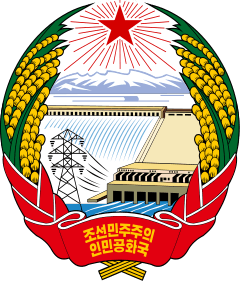Guinea-Bissau–North Korea relations
Guinea-Bissau–North Korea relations refers to the current and historical relationship between Guinea-Bissau and the Democratic People's Republic of Korea (DPRK), commonly known as North Korea. Neither country maintains an embassy in their respective capitals.
.png) | |
Guinea-Bissau |
North Korea |
|---|---|
History
During the Cold War, North Korea – like many other states aligned with the Soviet Union, or in general opposition to colonialism – provided military, political and diplomatic aid to the African Party for the Independence of Guinea and Cape Verde (PAIGC), the movement fighting Portugal in the Guinea-Bissau War of Independence.[1] Before independence, Amílcar Cabral and other members of the PAIGC traveled to North Korea, China, and Japan and met with Kim Il-sung in North Korea.[2][3] Following independence, Guinea-Bissau subsequently established diplomatic relations with North Korea on 16 March 1974.[4] Guinea-Bissau was one of many African countries to recognize North Korea but withhold recognition from South Korea in the mid-1970s.[5] Formerly, North Korea maintained an embassy in Bissau.[6]
In 1977, a few years prior to being overthrown, Guinea-Bissau's first independent leader – President Luís Cabral – visited Pyongyang, meeting Kim Il-sung together with his wife.[7] A decade later on his 70th birthday, in 1982, Kim Il-sung was awarded the Amílcar Cabral Order by the Bissau-Guinean government.[8]
References
- Karibe Mendy, Peter; Lobban Jr., A. (2013). Historical Dictionary of the Republic of Guinea-Bissau. Scarecrow Press. pp. 172 and 266. ISBN 978-081-088-027-6.
- Chaliand, Gérard; Vale, Michel (1978–1979). "Amilcar Cabral". International Journal of Politics. 7 (4): 15. JSTOR 7868864.
- Journal of Korean Affairs. Research Institute on Korean Affairs. 1971. p. 58.
- Yonhap News Agency (2002). North Korea Handbook. Seoul: M. E. Sharpe. p. 965. ISBN 076-563-523-2.
- Park, Sang-Seek (1978). "Africa and the Two Koreas: A Study of African Non-Alignment". African Studies Review. 21 (1): 73–88. doi:10.2307/523764. JSTOR 523764.
- North Korea News. Seoul: Naewoe Press. 1987. p. 67.
- Korea & World Affairs. Seoul: Research Center for Peace and Unification. 1977. p. 361.
- Summary of World Broadcasts: Far East, Part 3. London: British Broadcasting Corporation. 1983.
